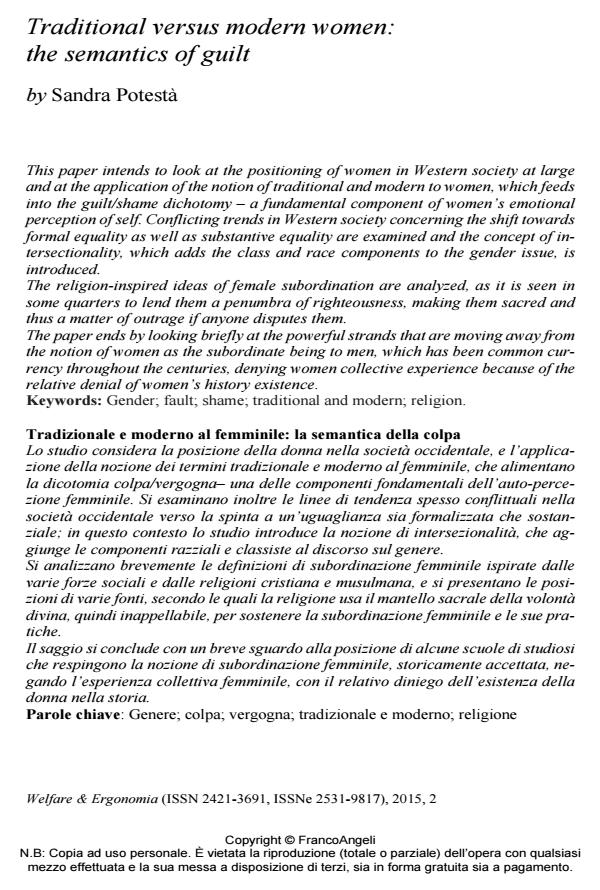Traditional versus modern women: the semantics of guilt
Titolo Rivista WELFARE E ERGONOMIA
Autori/Curatori Sandra Potestà
Anno di pubblicazione 2017 Fascicolo 2015/2
Lingua Inglese Numero pagine 19 P. 40-58 Dimensione file 233 KB
DOI 10.3280/WE2015-002004
Il DOI è il codice a barre della proprietà intellettuale: per saperne di più
clicca qui
Qui sotto puoi vedere in anteprima la prima pagina di questo articolo.
Se questo articolo ti interessa, lo puoi acquistare (e scaricare in formato pdf) seguendo le facili indicazioni per acquistare il download credit. Acquista Download Credits per scaricare questo Articolo in formato PDF

FrancoAngeli è membro della Publishers International Linking Association, Inc (PILA), associazione indipendente e non profit per facilitare (attraverso i servizi tecnologici implementati da CrossRef.org) l’accesso degli studiosi ai contenuti digitali nelle pubblicazioni professionali e scientifiche.
And at the application of the notion of traditional and modern to women, which feeds into the guilt/shame dichotomy - a fundamental component of women’s emotional perception of self. Conflicting trends in Western society concerning the shift towards formal equality as well as substantive equality are examined and the concept of intersectionality, which adds the class and race components to the gender issue, is introduced. The religion-inspired ideas of female subordination are analyzed, as it is seen in some quarters to lend them a penumbra of righteousness, making them sacred and thus a matter of outrage if anyone disputes them. The paper ends by looking briefly at the powerful strands that are moving away from the notion of women as the subordinate being to men, which has been common currency throughout the centuries, denying women collective experience because of the relative denial of women’s history existence.
Lo studio considera la posizione della donna nella società occidentale, e l’applicazione della nozione dei termini tradizionale e moderno al femminile, che alimentano la dicotomia colpa/vergogna - una delle componenti fondamentali dell’auto-percezione femminile. Si esaminano inoltre le linee di tendenza spesso conflittuali nella società occidentale verso la spinta a un’uguaglianza sia formalizzata che sostanziale; in questo contesto lo studio introduce la nozione di intersezionalità, che aggiunge le componenti razziali e classiste al discorso sul genere. Si analizzano brevemente le definizioni di subordinazione femminile ispirate dalle varie forze sociali e dalle religioni cristiana e musulmana, e si presentano le posizioni di varie fonti, secondo le quali la religione usa il mantello sacrale della volontà divina, quindi inappellabile, per sostenere la subordinazione femminile e le sue pratiche. Il saggio si conclude con un breve sguardo alla posizione di alcune scuole di studiosi che respingono la nozione di subordinazione femminile, storicamente accettata, negando l’esperienza collettiva femminile, con il relativo diniego dell’esistenza della donna nella storia.
Parole chiave:Genere; colpa; vergogna; tradizionale e moderno; religione
Sandra Potestà, Traditional versus modern women: the semantics of guilt in "WELFARE E ERGONOMIA" 2/2015, pp 40-58, DOI: 10.3280/WE2015-002004